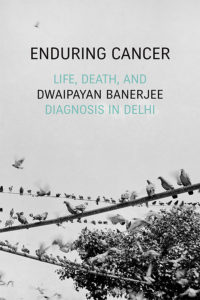Dwaipayan Banerjee is an Assistant Professor of Science, Technology, and Society (STS) at MIT. He earned his doctorate in cultural anthropology at NYU and has been a Mellon Postdoctoral Fellow at Dartmouth College. He also holds an M. Phil and an MA in sociology from the Delhi School of Economics. His research is guided by a central theme: how do various kinds of social inequity shape medical, scientific and technological practices? In turn, how do scientific and medical practice ease or sharpen such inequities? In doing so, Banerjee’s ongoing research pushes science and technology studies into the global south. He develops postcolonial and subaltern orientations in the scholarship on science, medicine and technology.
Professor Banerjee’s first book, Enduring Cancer: Life, Death and Diagnosis in Delhi (Duke University Press, forthcoming 2020), is an ethnography of cancer in India. Enduring Cancer presents the efforts of the urban poor in Delhi to carve out a livable life with cancer, as they negotiate an over-extended health system struggling to respond to the disease. Through ethnographic fieldwork, archival research and analyses of cultural texts, this book describes how cancer shapes and is shaped by such local social worlds. For example, this ethnography unfolds in Delhi, where for most of the urban poor a cancer diagnosis came too late for curative intervention. In such conditions, a cancer diagnosis was often the latest and most serious in a long series of episodes of infrastructural failures. Responsive public health interventions cohered around the work of managing social ties and psychosocial pain, so that patients might find at least find quiescence at the time of death. This book thus presents a picture of cancer in India as it grows out of these particular social conditions. It describes how the disease nestled into or tore apart already fragile kinship ties, why many spoke indirectly or not at all about the disease to those closest to them, and why some within the same neighborhoods could access treatment while others could not. To live with or alongside cancer, this book argues, is to be newly awakened to the fragility of social ties, some already made brittle by past histories, and others newly tested for their capacity to support.
Professor Banerjee’s second book Hematologies: The Political Life of Blood in India (Cornell University Press, forthcoming December 2019) is co-written with anthropologist Jacob Copeman. Hematologies examines how the giving and receiving of blood has shaped social and political life in north India in the twentieth and twenty-first centuries. Across a range of field sites, the book traces how the substance congeals political ideologies, biomedical rationalities and activist practice. From anti-colonial appeals to blood sacrifice as a political philosophy to contemporary portraits of political leaders drawn with blood, from the use of the substance by Bhopali children as activist material to biomedical anxieties and aporias about the excess and lack of donation. the book reveals a productive and dynamic relation between practices that produce and reproduce blood as a boundary-marking substance, and those that seek to re-imagine the substance as able to transcend moral imperatives of kin, caste and religion.
Prof. Banerjee’s current research project—A Counter History of Computing in India—tracks the historical and contemporary lives of computing technologies in India. Contemporary scholarly and popular narratives about computing and IT in the region suggest that even as India supplies cheap technological labor to the rest of the world, the country lags in basic computing education, research and development. The more generous of these accounts suggest that India is beginning to ‘catch up’ with the developed world. This perception fuels two further false assumptions. First, that Indian technology workers are low-skilled and not innovative. Second, that for decades India has been stealing rather than developing intellectual property. A Counter History of Computing in India challenges these representations. It explores a long-ignored postcolonial history of indigenous computing in India from the 1950s to the present, tracing the shifting relationship between the Indian state, computing technologies and local and global capital markets over this period. In presenting this account, Banerjee pushes social science research into taking account of global histories of computing, which have so far have predominantly focused on Europe and the United States.
Professor Banerjee’s research has been funded by the Levitan Prize for the Humanities, the Mellon Foundation, The Humanities Initiative at NYU, the National Science Foundation, the Wenner-Gren Foundation, and the Social Science Research Council. He has also earned the New York Advanced Certificate in Culture and Media, and his film The Beloved Witness on the Kashmiri poet Agha Shahid Ali was nominated for the Best Short Documentary at the New York Indo-American Film Festival.

